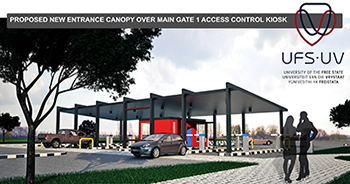
Illustration by Incline Architects |
The university community can look forward to two new infrastructure development projects on the Bloemfontein Campus. The construction of a new parking area for staff and students accommodated in the new Education Building, will begin as early as June 2015.
The project includes 113 parking places for students and 16 covered parking places for staff. According to Nico Janse van Rensburg, Senior Director at University Estates, the project will be tackled using several green approaches. “The parking area’s lighting will be solar-powered. The surface will not be the normal paving stone but will permit the water to drain into the ground and in this way be more environmentally friendly and minimise the greenhouse effect,” he says.
Several indigenous trees will beautify the area.
The new parking area will be situated opposite the UFS Sasol library’s student parking area, between the cricket field and the present parking area at the Education Building.
The second project involves a new roof structure at the Bloemfontein Campus’s main entrance security gate.
Since August last year, the university has been enforcing rigorous entrance controls. No person can access any of the five entrances of the Bloemfontein Campus without a valid entrance card. Should individuals not have a card, they must access the campus at Gate 5 in DF Malherbe Avenue where a temporary access card will be issued to them. Scanning for visitors and service providers is also available at Gate 1 (Nelson Mandela Drive) and Gate 5 (DF Malherbe Avenue).
The roof structure at the main entrance will serve as a security point. Primarily, it will provide shelter from the elements for those staff manning the area.
Nico says that the plan is to complete the projects before the end of the year. The projects are currently in the planning phase.
“The gate may possibly be closed for a day or two but the main work will be done during weekends. Certain lanes may also be closed from time to time to ensure the safety of both users and construction workers,” says Nico.
Staff and students will be advised well in advance if and when the gate will be closed.